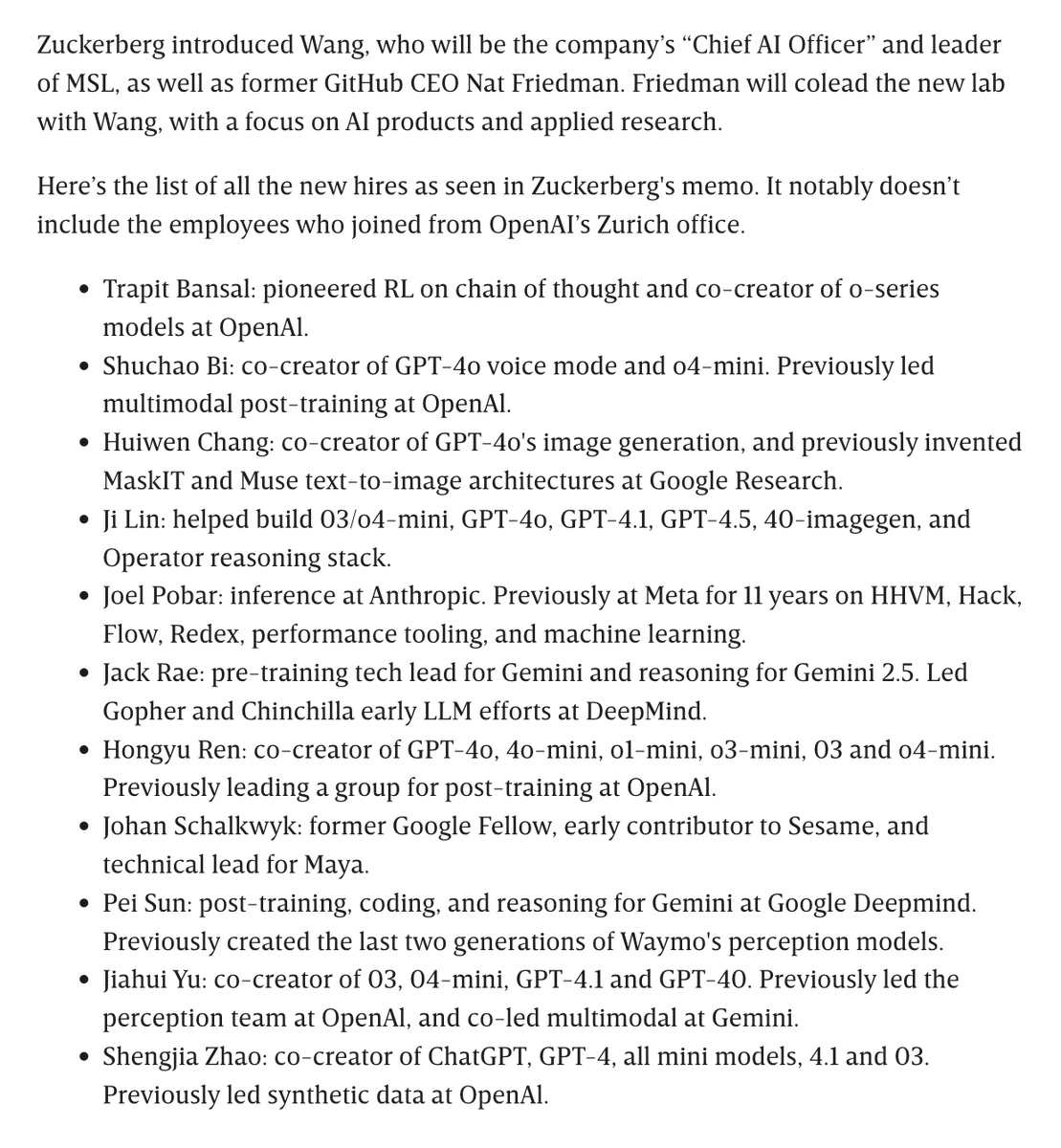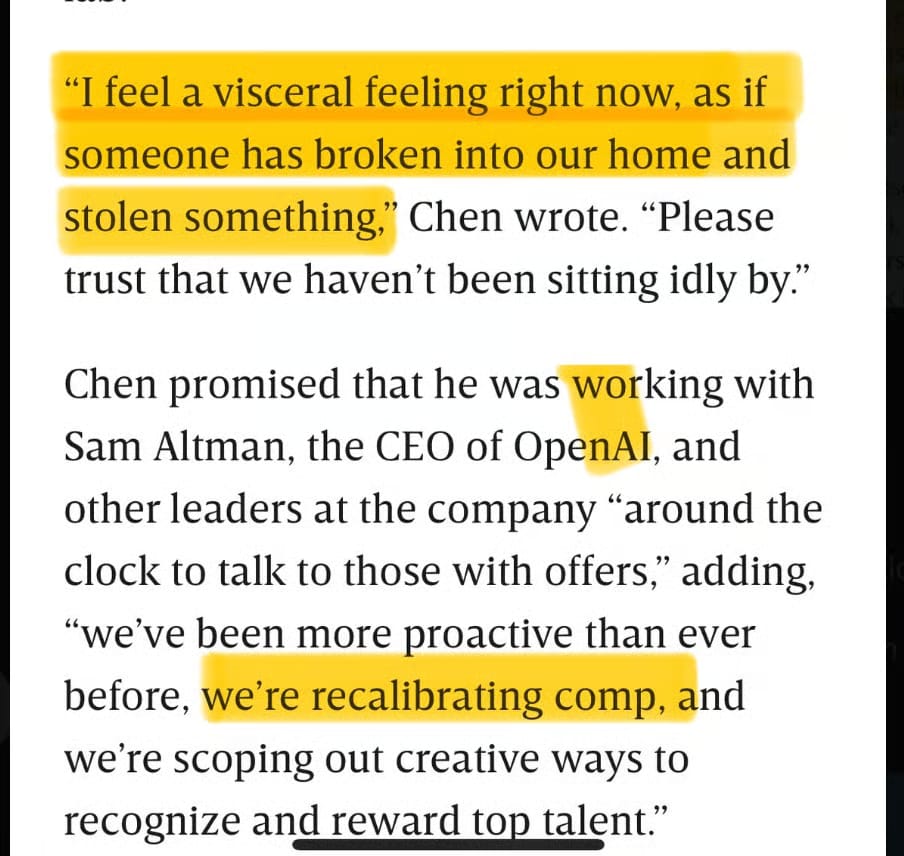- Avicenna
- Posts
- AI is Hacking Biology
AI is Hacking Biology
Welcome back to the Avicenna AI newsletter.
Here’s the tea 🍵
Google is hacking biology 🧬
OpenAI is bleeding🩸
Microsoft playing hardball ⚾
Avicenna is my AI consultancy. I’ve been helping companies implement AI, doing things like reducing processes from 10+ mins to <10 seconds. I helped Claimo generate $40M+ by 10x’ing their team efficiency.
Enquire on the website or simply reply to this email.
DeepMind is making biology traceable
Google DeepMind recently released AlphaGenome.
AlphaGenome is a model that reads up to 1 million bases of DNA (that's letters in your genetic code) and predicts how any mutation will change molecular function across the entire genome. It doesn't just look at individual genes, it understands how a single change in any gene can cause damage across the whole system.
Your DNA is like a massive instruction manual for building and running your body. Sometimes there are typos in this manual: maybe an A becomes a G, or a letter gets deleted. These tiny changes can cause huge problems, but we've never really understood exactly how.
Think of it this way: imagine you're reading a novel and you change one word on page 10. That change might affect how you understand something on page 300. DNA works the same way; a tiny change in one spot can affect things happening far away.
AlphaGenome is the first tool that can actually predict these long-distance effects.
The old way of doing this was terrible. Previous models were like trying to read a book with bad glasses, where you could either focus really well on a tiny section of DNA, missing the big picture, or you could look at the entire genome but it’s all blurry, missing important details.
Plus, each model could only understand one type of effect. You'd need 10+ different models to get a partial understanding of what a mutation does. It was like having 10 translators who each only knew one chapter of a book.
AlphaGenome changes this completely. It can see 1 million DNA letters at once AND understand every single letter perfectly.
Remember, only 2% of your DNA directly codes for proteins (the stuff that builds your body). The other 98% is just regulatory DNA; it controls when genes turn on/off, how much protein gets made, where it gets made, and a thousand other things. This is the part we've been blind to until now.
AlphaGenome helps illuminates the actual regulation of our bodies.
From a pure DNA sequence, AlphaGenome can predict everything about how your genes actually work in real life. It tells you which genes are turned on in your brain vs your liver. It shows where your DNA gets cut and pasted back together to create different versions of the same gene. It maps how your DNA folds up in 3D space inside cells. It reveals where proteins attach to DNA to control it and which parts of DNA are supposed to be used at any given time.
Think of it like this: the DNA is the instruction manual for building you, and AlphaGenome is trying to predict everything; every switch, dial, and nob that determines how those instructions actually get used.
This is the best part.
They tested it on real disease mutations, specifically the TAL1 mutations that cause T-cell leukaemia.
From a single base change, AlphaGenome predicted the complete cascade:
The mutation creates a new binding site for a protein called MYB
This activates an enhancer
This increases a specific histone modification
Then this ultimately up regulates the gene and causes cancer
One letter change and it maps the full mechanism.
The benchmarks are basically unmatched as well.
AlphaGenome beats specialist models in 22 out of 24 tasks. It outperforms everything else in predicting variant effects. Unbelievably, AlphaGenome does all of this in a single pass, and it uses half the compute of the previous best model (Enformer).
Plus, they trained this whole thing in just 4 hours!
This is just an incredible advancement. I can’t even begin to describe what it means that we’re doing this. We’re no longer guessing when it comes to biology; we’re mapping it out. We’re making it programmable. If we can describe how it works in code, we can simulate it and then understand how to fix it. This is essentially what DeepMind did with AlphaFold and the protein folding problem.
Every failed gene therapy, every mysterious rare disease, every drug that didn't work is essentially a misunderstanding of DNA. This is the first time we’ll be able to start seeing what's actually happening.
Imagine being able to simulate any genetic change before testing it. We can design synthetic DNA with precise control over when and where it activates. We can even understand why some people get diseases and others don't. This is all slowly becoming possible.
This is quite likely the most significant work happening in the world of AI.
The coolest thing is that DeepMind has released an API so researchers can test it, and they’re planning to release the full model later. You can check it out here [Link].
We are making biology programmable… it’s just an insane thing to even think about.
Zuck is on a mission
A few weeks ago, I wrote about Meta offering researchers nine-figure signing bonuses. I’ll be honest, I didn’t think much would come of it.
I was very wrong.
Just look at how many people, and who, Zuck has poached from OpenAI.

Every single one of these people is a powerhouse. It is a very, very big deal that these people have joined Meta.
Considering Meta doesn’t even have a reasoning model right now, I’m expecting the next versions of Llama to be significantly better than previous ones.
Recently Sam Altman did a podcast talking about Meta trying to poach talent and said that whoever has left or will leave isn’t the best they have. A smart move, because then whoever leaves is considered not great and someone who doesn’t buy in to the culture. It’s quite clear now that the people who have left are some of the very best at OpenAI, and have been integral to OpenAI’s success.
Trapit Bansal co-created the o1 reasoning models with Ilya Sutskever – if anyone is getting that $100M signing bonus, it’s him.
Ultimately, this is good for us, the average person, because it means Meta will open-source much better models.
Is OpenAI worried?
Absolutely.
OpenAI’s Chief Research Officer Mark Chen apparently said in a company Slack that their team feels like someone has “broken into [their] home and stolen something.” OAI is feeling it right now. This comes as people are doing 80+ hour weeks and employees took a company-wide week off last week.
Who wouldn’t take more money for less work at Meta, while also having access to more compute and getting to work on open-source AI?
Sounds like a win to me.
Interestingly, it seems that internally, Meta has changed from using their own Llama models to Anthropic’s Sonnet [Link]. I actually think this is a good thing – how can they build the best models if they’re not actively using them?
Perhaps this is a shift in the culture. We will see, I suppose.
Side note: Shuchao Bi, co-creator of voice mode in ChatGPT, recently gave a lecture where he laid out his hypothesis on how to reach SuperIntelligence. It’s an interesting watch if you want to understand the technical bets labs are making [Link].
Zuck didn’t stop there either.
Meta also hired Ruoming Pang who led Apple’s AI models team for $200M+ [Link]. Apple didn’t even bother trying to match the offer, since that’s significantly more than their own CEO’s salary of $74.6M.
Microsoft walking away?
As if things couldn’t get worse for OpenAI, they’re having issues with their sugar daddy Microsoft. OpenAI is planning to convert into a for-profit company so they can raise more capital and IPO at some point. But this requires Microsoft’s approval.
See, the deal that OAI signed means that Microsoft has the IP rights to all OAI models until 2030, as well as a 20% revenue share. The key word here is revenue. 20% of everything coming into OAI is insane.
Is it a bad deal?
Perhaps. But, that’s the deal they made. They have no one to blame but themselves.
OpenAI now wants to waive this deal for a more favourable deal that swaps the revenue share with royalty and equity.
But Microsoft isn't budging. And why should they? The current arrangement is a goldmine for Microsoft. They get 20% of everything coming in to OpenAI (up to $92B), exclusive rights to sell OpenAI's models through Azure, and access to all the IP until 2030.
Here’s OAI’s problem: Microsoft doesn't really need to own OpenAI to benefit from it. They're already making bank from the revenue share, and frankly, they’ve been hedging their bets anyway. Last month, they added xAI’s Grok model to Azure, and I won’t be surprised if they add more down the line.
Microsoft's position is basically this: "We're happy with the status quo, thanks." And if OpenAI can't get this conversion done by December? Tough luck. SoftBank has already said they'll slash $10B from their $30B investment if the for-profit conversion doesn't happen.
Microsoft holds all the cards here. They can just run out the clock on the current contract. They have no need to push for the end of year deadline. They can keep this going until 2030 while OpenAI burns through cash and finds other ways to raise money.
You can read more about this here [Link].
I guess the good thing for OpenAI is that ChatGPT is ever-growing. ChatGPT now has 500M weekly active users. By all accounts, this is an absolutely insane number.
Yes this is a (relatively) shorter newsletter. I’m travelling this weekend and will be back next week with some serious heat. Let’s just say, Chinese labs have been releasing some insane stuff and we need to talk about it.
I want to keep bringing these AI updates to you, so if you’re enjoying them, it’d mean a lot to me if you became a premium subscriber.
How was this edition? |
As always, thanks for reading ❤️
Written by a human named Nofil


Reply